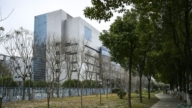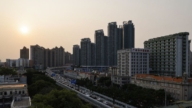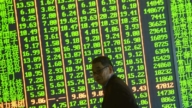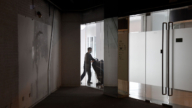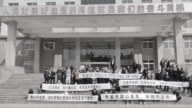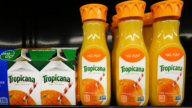【新唐人2013年11月13日訊】感嘆物價飛漲,中國百姓喊出:「人民幣對不起中國人」。這是中共十八屆三中全會期間,中共喉舌《央視》在街頭採訪民眾所謂「最關心的改革」看法時,一名年輕男子發出的感嘆。有分析指出,人民幣在國內持續貶值,可是它對美元的匯率不斷攀升,造成老百姓入不敷出,外資企業也叫苦不迭。
11月12號,中共「閉門」召開4天的三中全會閉幕,會議期間,《央視》外語頻道記者到街頭就「你最關心的改革」話題進行採訪,許多民眾表示:不知道三中全會在幹甚麼,卻大量抱怨房價高、物價高、醫療費昂貴。一名男子更感嘆:「人民幣對不起中國人。」
北京時政觀察人士華頗:「人民幣在國內是持續貶值,物價飛漲,可是它對美元的匯率卻是不斷攀升,對於普通中國老百姓來講,物價飛漲,他們的收入已經入不敷出了,所以他們天天抱怨物價飛漲,東西越來越貴。」
北京時政觀察人士華頗指出,廣大的外貿企業也叫苦不迭,因為人民幣的匯率持續升值,他們出口競爭力價格的優勢越來越弱,那麼誰得利呢?
華頗:「那就是一些特殊群體,因為他們可以把物價在國內,可以推的非常高非常高,使人民幣貶值,他們收取這些貶值的人民幣之後,又可以很好的價格兌換成美元匯往國外,所以人民幣雙規制使這一部分人發家了。」
最近大陸一條新聞說,李大媽在市場上買大米時,發現大米已漲到每斤3.3元。她記得這種大米在2005年每斤為1.9元。「首都經貿大學」經濟學教授蘭紀平以大米價格為例,計算出當前1000元人民幣的購買力,相當於05年的576元,等於8年時間人民幣縮水了424元。
大陸《理財》週刊指出,當年幾十塊錢的衣服如今賣到上千元﹔幾千元1平米的房價暴漲到3、4萬。如果拿這些作標本,人民幣8年來的貶值幅度至少超過500%!
中國金融智庫研究員鞏勝利:「但是老百姓的收入沒有同步的增長, 那麼這個錢誰來給?那無非就是老百姓多花了錢,沒有買到應該得到的東西。」
香港《東方日報》社論指出,中共這些年的印鈔量世界第一,到去年底,中國的貨幣供應量已達97.4萬億人民幣,接近全球貨幣供應總量的1/4,是美國的1.5倍。評論說,這種瘋狂印鈔,相當於對老百姓巧取豪奪。
原《河北人民廣播電臺》編輯朱欣欣:「中共對百姓的掠奪,它分顯形的和隱形的這麼兩種,比如顯形的,我們都可以體會到,比如中國的各種稅收多如牛毛,各種巧立名目的收費也特別多,老百姓負擔特別重,這是明顯的。」
至於中共對百姓隱形的掠奪則更多。原《河北人民廣播電臺》編輯朱欣欣指出,中共大量印鈔,造成富者更富,窮人更窮,有錢人運用金融槓桿不斷放大財富,而窮人省吃儉用卻難以度日。
朱欣欣:「官方所宣傳的所謂的中國的強盛,實際上完全是一種畸形的,虛幻的一個形象,是官富民窮,所謂說的國富民窮,連國都談不上,實際上現在這些權貴階層,這幾大家族把財產完全都壟攏到自己手裡面。」
有報告顯示,中國0.4%的人掌握了70%的財富。中共高層和太子黨家族圈錢、圈地、洗錢,各個家族的資產高達上千億元。
另據報導,中國石油、工商行、移動等大型國企在美國上市,以及美國公司在中國落地,都有美國財團和政界人物安排、主導,並與中共高層江澤民、周永康等保持親密關係。
中共黨媒《人民日報》旗下的《人民論壇》2010年第4期透露:有關機構在2009年發佈了中國3000家族財富榜,3000個家族財富總值16963億元。文章公開承認富豪家族三大來源其中的兩大來源,分別是紅色家族與頭頂紅帽的官商。
採訪編輯/李韻 後製/孫寧
China’s RMB Exchange Rate With Dollar Rises, But Devalues Internally
Chinese people are mocking rising exchange rate prices for the Renminbi, despite it having devalued inside China. One young man was interviewed by China’s Central Television (CCTV) during the Third Plenary Session of the Chinese Communist Party (CCP).
He highlighted that this is the issue of “most concerns for reforms". Analysts say that the RMB has been repeatedly devalued in China. However, the exchange rate against the dollar has continued to rise. The result is that the Chinese people can’t afford to live, and foreign companies are constantly complaining.
On November 12, the four-day party meeting came to a close. Prior to this, a CCTV reporter interviewed Chinese people on the street, with many responding that they didn’t know what the Third Plenary Session was about. Instead, people complained about increasing house prices, and expensive medical care. One man said that the “RMB is in a sorry state for the Chinese people."
Hua Po, current affairs commentator: “RMB has repeatedly depreciated, but the price of goods has risen. The exchange rate for the RMB against the dollar has continually risen. For ordinary Chinese people, prices are higher, but their incomes can’t pay their bills. Thus, they complain everyday about the high prices."
Hua Po says that foreign trade companies are also complaining. Because RMB exchange rates are constantly rising, their export competition has been deeply weakened. Who is benefiting from this situation?
Hua Po: “The privileged groups within the CCP can benefit. This is because they can push the prices very high inside China, and thus make the RMB devalue. Once they acquire devalued RMB, they can exchange it to dollars at a good rate, and then transfer it abroad. This system has become very profitable."
Chinese state media reported that Grandma Li’ went to buy rice in a market. She found the price went up to 6.6 yuan per kilogram, and could remember that it was 3.8 yuan per kilogram in 2005. Lan Jiping, Professor at Capital University of Economics and Business in Beijing, also took rice as an example. Lan calculates the value for 1000 yuan, which is equivalent to 576 yuan in 2005. It means that 1000 yuan has lost value by 424 yuan within eight years.
Money Weekly reported that cloth was worth a few dozen yuan in the past. It is now selling for over a thousand yuan.
Property prices have risen from several thousand yuan per square meter to between 30,000 to 40,000 yuan. Taking these cases as examples indicates that RMB has devalued by 500% within eight years.
Gong Shengli, researcher, China Financial Intelligence Unit:"Chinese people’s income hasn’t increased accordingly. Who should pay them money?
Civilians have to pay more, but they don’t get the income they need to do so."
Hong Kong’s Oriental Daily describes that China is the worlds largest bank note printing country. At the end of 2012, China’s money supply reached 97.4 trillion yuan. This is nearly taking up 25% of the global total, and is 1.5 times greater than the US. The report says that the madness of printing money is equivalent to simply ripping off it’s civilians.
Zhu Xinxin, former editor, Hebei People’s Radio Station:“The CCP uses different ways to plunder from its citizens, some of which are visible, the others invisible. There are so many different taxes and fees, which civilians become heavily burdened by.”
Zhu Xinxin suggests that large amounts of bank notes have been printed, resulting in the rich becoming richer, and the poor becoming poorer. Rich people are using financial leverage to increase their wealth, and poor people are finding it difficult to survive.
Zhu Xinxin: “CCP propaganda of China as a prosperous nation is an entirely illusory image. The truth is one of rich officials and poor civilians. Actually, the privilege group of CCP officials have seized the national assets in their hands."
Sources indicate that 0.4% of the Chinese people have seized 70% of China’s wealth. The high-level CCP, and the families of officials and princeling covert both the money and land. They launder the money, and their assets have reached thousands of billions of yuan.
Sources say that PetroChina, China Mobil, Industrial and Commercial Bank, and other major state-run companies’ were listed on the US stock market. US companies are also listed in China. These businesses are allegedly arranged and led by US financial groups and politicians, who are closely associated with Jiang Zemin and Zhou Yongkang.
The state-run People’s Tribune newspaper has reported that in 2009, relevant organs announced the 3,000 richest Chinese families. These families’ wealth has a net worth of 1.69 trillion yuan. The article admitted that two out of three resources of the richest families are “red families and red businessmen."


